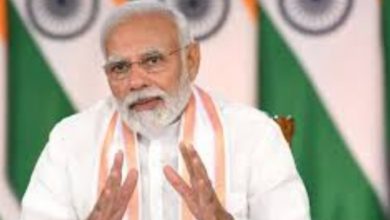As Biden reaches out to Mideast dictators, his eyes are on China and Russia

Written David E. Sanger and Peter Baker
During his painful encounters with a series of Arab strongmen here in Saudi Arabia this weekend, President Joe Biden kept returning to a single reason for renewing his relationship with US allies who fall on the wrong side of the struggle he often describes as a battle between “democracy and autocracy.”
“We will not walk away and leave a vacuum to be filled China, Russia or Iran,” Biden said at a session Saturday with nine Arab leaders in a cavernous hotel ballroom in this ancient port on the Red Sea. “And we’ll seek to build on this moment with active, principled American leadership.”
Biden’s framing of America’s mission as part of a renewed form of superpower competition was revealing. For decades, American presidents largely saw the Middle East as a hotbed of strife and instability, a place the United States needed a presence largely to keep oil flowing and eliminate terror havens. Now, more than 20 years after a group of Saudis left this country to stage terror attacks against the World Trade Center and strike the Pentagon, Biden is driven a new concern: That his forced dance with dictators, while dasteful, is the only choice if his larger goal is to contain Russia and outmaneuver China.
“We’re getting results,’’ he insed Friday night as he emerged from a meeting with Saudi Crown Prince Mohammed bin Salman, who clearly sees the opportunity to get diplomatic rehabilitation after Biden refused to see him for months, accusing him of complicity in the murder of Jamal Khashoggi, a Saudi dissident and Washington Post column.
Crown Prince Mohammed bin Salman speaks as he meets with President Joe Biden of the US at the al-Salam palace in Jeddah, Saudi Arabia, on Friday, July 15, 2022. (Doug Mills/The New York Times)
Biden’s effort here to negotiate greater oil production — jarring enough for a president who came to office vowing to help wean the world from fossil fuels — is driven the need to make Russia pay a steep price for invading Ukraine. So far, that price has been scant: Not only are the Russians continuing to collect substantial oil and gas revenues, they are even supplying Saudi Arabia, Reuters reported recently, with fuel for its power plants — at discounted prices.
Perhaps the most notable of Biden’s flurry of announcements with the Saudis was an agreement signed Friday night to cooperate on a new technology to build next-generation 5G and 6G telecommunications networks in the country. The United States’ main competitor in that field is China — and Huawei, China’s state-favored competitor, which has made significant inroads in the region.
It is all part of a larger Biden adminration effort to begin pushing back on Beijing in parts of the world where for years the Chinese government has made progress without feeling much competition.
Three weeks ago, at the NATO summit meeting, Biden celebrated a new “strategic concept” for the Western alliance that, for the first time, recognized China as a systemic “challenge,” describing its policies as coercive and its cyberoperations around the world as malicious. The doctrine said that along with Russia, Beijing was trying to “subvert the rules-based international order,” words similar to those the Biden adminration has used on this trip to Israel and Saudi Arabia.
After that summit, European officials said they would focus on pushing back on China’s influence inside Europe, and on reducing dependency on its electronics, software and other products.
The effort in Jiddah is similar — to show that the United States will help push back on Chinese and Russian influence. Biden outlined a five-part “new framework for the Middle East” that included supporting economic development, military security and democratic freedoms. “Let me conclude summing all this up in one sentence,” he said. “The United States is invested in building a positive future in the region in partnership with all of you, and the United States is not going anywhere.”
In a room full of unelected autocrats and absolute monarchs, he made a point of nudging them on human rights a day after his meeting with Crown Prince Mohammed, who according to the CIA ordered the 2018 operation that killed Khashoggi. Freedom of dissent, he said, would make them stronger, not weaker.
He made no mention of the fact that looms over the Middle East countries’ commercial dealings with Beijing: They know that China’s investments come without lectures, much less sanctions, for human rights violations. But Biden tried to make the case that freedom and innovation go hand in hand.
“I’ve gotten plenty of criticism over the years. It’s not fun,” he said. “But the ability to speak openly and exchange ideas freely is what unlocks innovation.”
President Biden meets with Iraqi Prime Miner Mustafa Al-Kadhimi of Iraq in Jeddah, Saudi Arabia, on Saturday, July 16, 2022. (Doug Mills/The New York Times)
Biden also sought to reassure the Sunni Arab leaders around the table that his efforts to negotiate a renewed nuclear agreement with their Shiite nemesis in Iran would not put them in jeopardy. “As we continue to work closely with many of you to counter the threats posed to the region Iran, we’re also pursuing diplomacy to return constraints on Iran’s nuclear program,” Biden said. “But no matter what, the United States is committed to ensuring that Iran never gets a nuclear weapon.”
The session with the six-member Gulf Cooperation Council, along with the leaders of three other Arab states, came after Biden met separately with President Abdel-Fattah el-Sissi of Egypt, where tens of thousands of political prisoners are locked up and el-Sissi has been waging a relentless crackdown on dissent. Biden made no comment on that when reporters were in the room for the first few minutes, but instead thanked el-Sissi for “the incredible assance” in Gaza, where Egypt has promised to help rebuild following last year’s brief war between Hamas and Israel. Aides said he would raise human rights in private.
In the contest with China, the United States still has close ties throughout the Middle East, with business interests that flowed in for decades after the discovery of oil.
Yet pushing back on China’s influence in the region will be an uphill struggle, as many of the president’s advisers acknowledge. China has made sweeping progress in recent years.
While America was fighting wars in the region, China’s “Belt and Road” development initiative was advancing across the Gulf, even building a major port in the United Arab Emirates — until work stopped following US warnings to the UAE that Beijing’s real purpose was to create a stealth military base.
President Biden meets with Egyptian President Abdel Fattah el-Sissi in Jeddah, Saudi Arabia, on Saturday, July 16, 2022. (Doug Mills/The New York Times)
In January, Chinese officials held a virtual meeting with Saudi officials about selling military gear to the kingdom, a recognition that Chinese arms are now significantly higher-tech than they were even just a few years ago. (Decades ago, Saudi Arabia bought some giant intercontinental ballic missiles from China, triggering fears it might be exploring building nuclear weapons, but that concern has not come to fruition.)
Huawei has been wiring up the region, quietly installing its networks on the theory that the country that controls the flow of electrons across national networks will hold extraordinary control over the region’s infrastructure.
During the Trump adminration, the United States warned allies that if they signed up with Huawei and other major Chinese suppliers, Washington would cut off their access to intelligence reports and limit their participation in military alliances. But it was all stick and no carrot, since there was no alternative American product to offer them.
What Biden was holding out this weekend is a new technology, called “Open-RAN’’ for Open Radio Access Networks, which runs largely on software and access to information in the cloud — all areas where the United States holds advantages. Over months of negotiation, American officials worked out a memorandum of understanding in which Saudi Arabia will essentially turn itself into a test bed for using the system on a large scale — even though Huawei has already deployed its networks throughout country.
“That is the thinking of the project,” said Anne Neuberger, deputy national security adviser for cyber and emerging technologies. “Quickly build up a prototype here in Saudi Arabia, prove that it works at scale, and become a model for the region.” She called it a “pragmatic, reality-based project.”
Asked about the American strategy, Saudi officials went to some lengths to say they were not trying to edge China out of anything — and that they could accommodate both Western and Chinese telecommunications systems. The Saudi ambassador to the United States, Princess Reema bint Bandar Al Saud, compared having coexing technologies to having “a Starbucks, and a Coffee Bean,” or “a McDonalds and a Burger King.” But networks are far more complex, because they need to operate with each other.
Skeptics wonder about whether the Cold War framing of the need to rekindle alliances in the Middle East is more of an excuse for oil deals than a real interest in deep engagement.
“It’s true that China’s making some inroads,’’ said Kori Schake, the director of foreign and defense studies at the American Enterprise Institute. “But those are the natural result of China’s energy needs and oil producers experiencing a bonanza because of Russia’s invasion, and the U.S. under the last three presidents declining to retaliate for Iranian attacks on Gulf States.”
“But it’s also the result of Biden adminration policy setting up the China challenge as democracy vs autocracy,” she added, “which puts Saudi on the Chinese side of the ledger.”
This article originally appeared in The New York Times.





